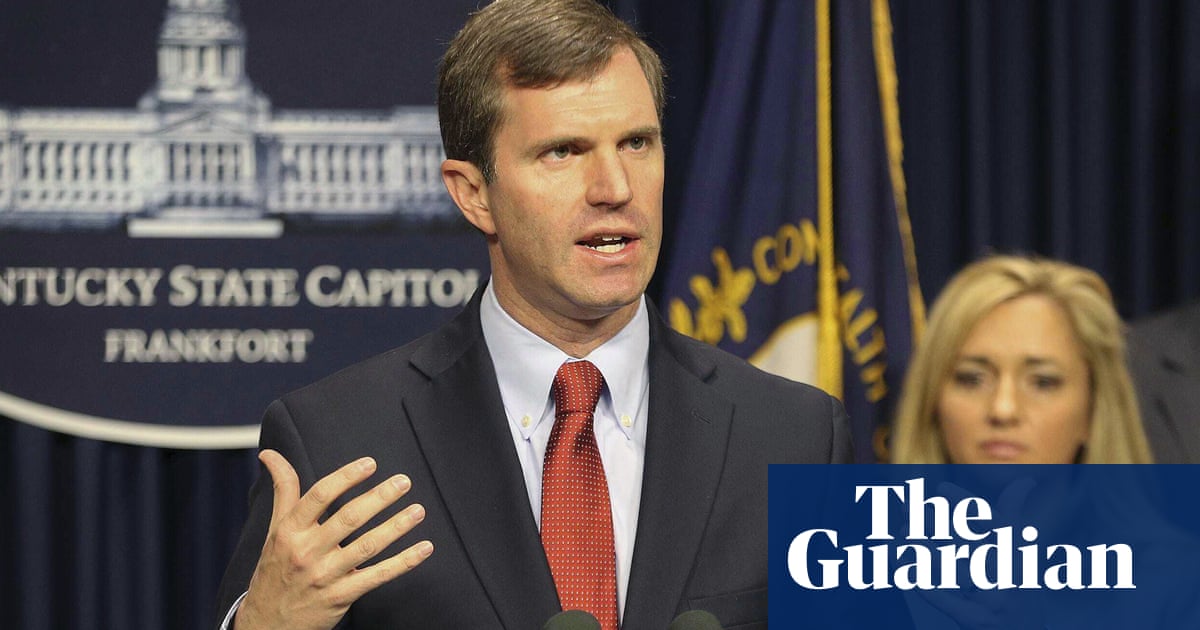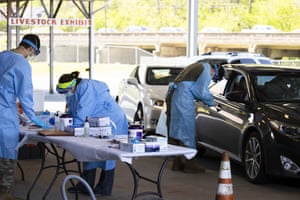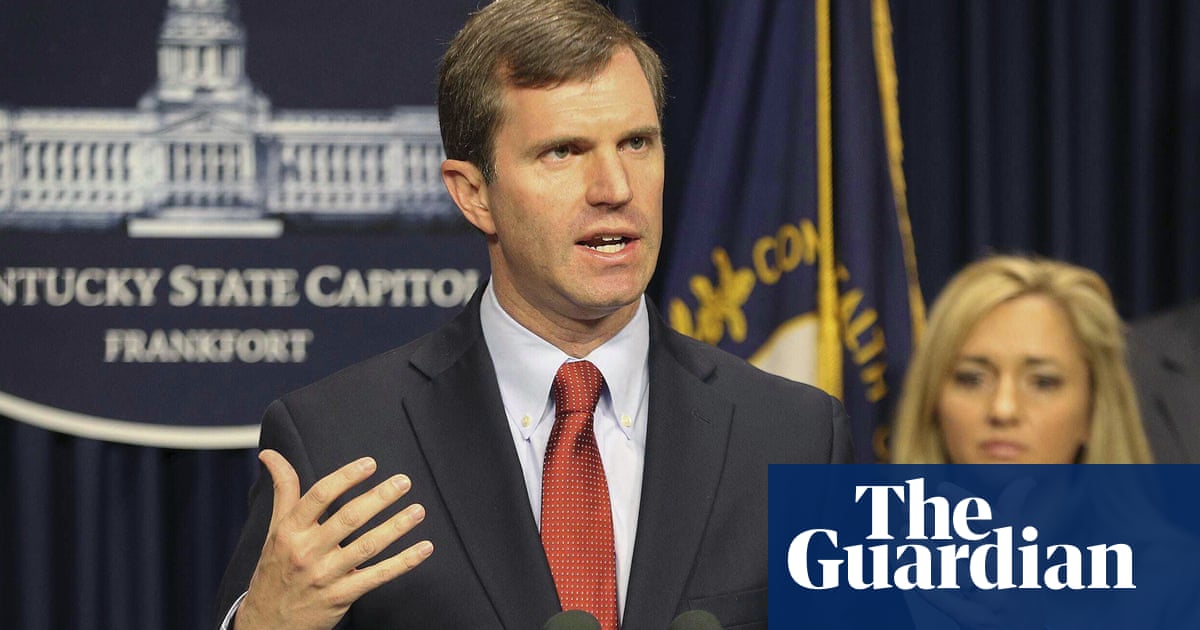Two states: one Democrat, one Republican. Two very different outcomes
Kentucky governor Andy Beshear took early measures to halt the spread of Covid-19 while Tennessee limited government mandates

Just last month, when he was still regularly wearing a suit and tie, Kentuckys rookie governor, Andy Beshear, told schools across the southern state that they needed to be prepared to close down with little notice to contain the spread of Covid-19.
At the time, there were just a handful of cases in Kentucky. Bars and restaurants were still open, people shook hands and live sports was on TV. But on 11 March, Beshear, a 42-year-old Democrat, told Kentucky residents that the actions they took over the next month would be critical in determining how the state would fare in the pandemic.
As Beshear was wrapping up, the man he defeated by just 5,136 votes in Novembers gubernatorial election offered a glimpse of how differently he might have handled the health emergency had he been victorious.
BREAKING NEWS: Chicken Little has just confirmed that the sky IS indeed falling, wrote the former Republican governor Matt Bevin on Twitter. Everyone is advised to take cover immediately and bring lots of toilet paper when they do so
Whether Bevin would have remained so blase if he were actually governor is impossible to know.
He took the right approach
On paper, Kentucky is not poised to do well in a pandemic. According to the Kaiser Family Foundation, 43.6% of Kentuckys adult population is at a higher risk for serious illness if infected with Covid-19, putting Kentuckys risk factor second only to West Virginias in the US.
Kentucky had reported 3,373 Covid-19 cases with 185 deaths as of Wednesday. Though it is not out of the woods, experts say the state appears to be flattening the curve.

Its encouraging that we are seeing slower acceleration than has been seen in other states and I do think it is largely due to the social distancing measures that were implemented early and aggressively, said Kathleen Winter, an epidemiologist with the University of Kentucky. Its too soon to say were really on the right track and whether this will have a longer-lasting impact.
Were not where we want to be ultimately, but were certainly making progress, said Paul McKinney, associate dean for research at the University of Louisvilles school of public health and information sciences. And were not nearly as bad as we could have been.
While other states lagged behind, Kentucky was nearly keeping pace with measures adopted in coronavirus hotspots like New York: on 5 March Beshear started holding daily press briefings on the virus; on the 6th, he declared a state of emergency; on the 16th he closed down bars and restaurants; on the 19th he banned all mass gatherings, including church services; and on the 22nd he announced the closure of all businesses that were not life sustaining.
Combined with his quick pandemic response, his calm, empathetic daily briefings (which he starts by saying, Repeat after me: we will get through this.) have seen his popularity explode in recent weeks. Some have likened him to Mr Rogers, but he has also been firm, calling out those that have defied social distancing orders, including dozens of people who protested against the stay-at-home measures last week.

I think that the governor here, our current governor, took the right approach, said McKinney when asked about how Kentuckys coronavirus might have looked with different election results.
Al Cross, director of the University of Kentuckys institute for rural journalism and community issues and a longtime observer of politics in the Bluegrass state, said he couldnt say that Bevin would necessarily have handled the situation differently and that many had made a lot of stupid assumptions about how the former governor might act.
It would certainly be in character for Bevin to behave more like the Republican governors who have been more lax than Beshear, but I have to believe that he would keep an open mind on this question because its so fundamentally important, he said. Granted, this is the guy who exposed his children to chicken pox because he thought it was the best thing for them.
A very different outcome across the border
To get a sense of how things might have looked with different leadership, Kentuckians have been looking across their southern border into Tennessee, where Governor Bill Lee was initially reluctant to close down bars, restaurants and non-essential businesses, hoping to find a balance between economic security and public health.
Lee held off on issuing such a stay-at-home order even as the states three largest cities Nashville, Memphis and Knoxville issued orders of their own. While Lee issued recommendations for Tennesseans to avoid crowds, he said no mandates were necessary to keep them apart, that the states residents could be trusted to do their part without government interference.
In the end, Tennessee adopted many of the same measures that Kentucky did but they usually came about a week later.
As Tennessee lagged behind, Beshear warned Kentuckians not to travel there in late March.

Tennessee had reported 7,842 confirmed cases and 166 deaths as of Wednesday. Charts created by Kentucky resident and educator Stephanie Jolly comparing infection rates and numbers in Tennessee and Kentucky show a steeper rise in cases in Tennessee while Kentucky maintained a flatter curve. They have received a fair deal of attention in Kentucky recently as a sign that social distancing efforts have paid off, though there are caveats: Tennessee has conducted more testing and has a higher population and Winter, the epidemiologist, says its more useful to look at hospitalizations, though that data is harder to acquire.
I think we could have been facing a very different outcome and a lot of Kentuckians are recognizing that as well, said Jolly.
Citing the devastating economic impact of the shutdown and an assertion that the viruss spread had been slowed to a manageable level, Lee announced on Monday that he would not be extending Tennessees stay-at-home order past its 30 April expiration and that some businesses could begin reopening as soon as 27 April.
While the health outlook is showing signs of improvement, our economic outlook tells a very different story: record unemployment numbers, thousands of businesses closed, he said. For the good of our state, social distancing must continue but our economic shutdown cannot.
However, the lifting of restrictions does not apply to six Tennessee counties that have their own health departments among them, the counties home to the states largest cities. Those areas will formulate their own reopening strategies and timelines.

Lees announcement came as the governors of Georgia and South Carolina said that they, too, would be reopening their economies and relaxing restrictions in the coming days.
Across the border in Kentucky, Beshear has remained more cautious, saying a limited reopening is dependent on meeting benchmarks, particularly a 14-day decline in the number of new cases and the expansion of testing capabilities. And although businesses may reopen in the coming weeks and months, Beshear has worked to temper expectations that life will fully return back to normal soon, saying gatherings like summer weddings and even fall sporting events may be in jeopardy.
On Monday, the director of the National Institute for Allergy and Infectious Diseases, Dr Anthony Fauci, warned that failing to follow careful guidelines of a gradual reopening could backfire and result in a surge in cases.
It does go to show why elections matter and that elections have consequences, said James Line, 24, a former Beshear campaign staffer who is the administrator of a Beshear meme Facebook group that has gained popularity as a result of the governors handling of the pandemic. If 5,000 votes had gone the other way we would have another governor right now and probably a lot more lives lost.
Read more: https://www.theguardian.com/world/2020/apr/23/us-coronavirus-outbreak-tennessee-kentucky
